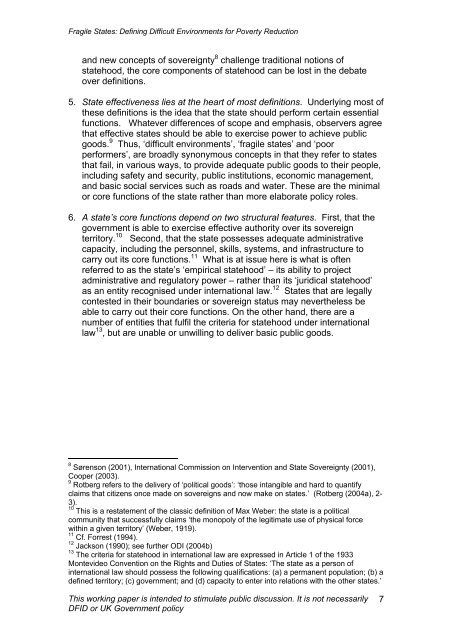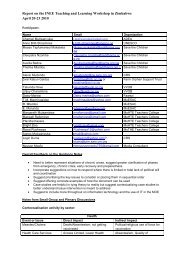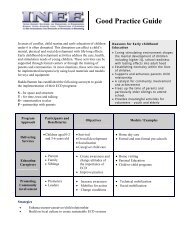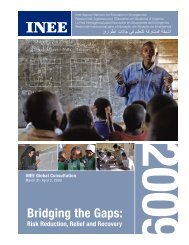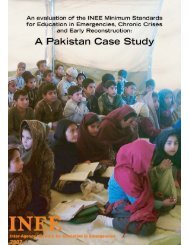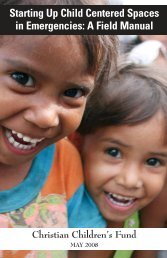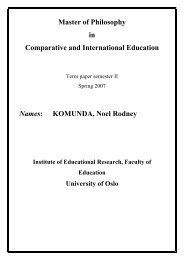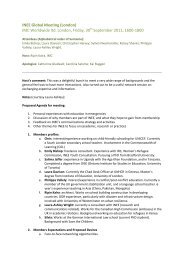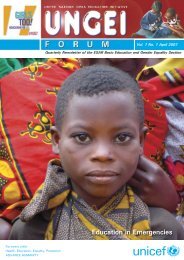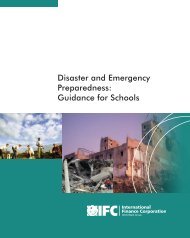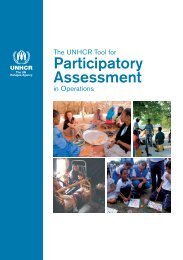Fragile States: Defining Difficult Environments for Poverty ... - INEE
Fragile States: Defining Difficult Environments for Poverty ... - INEE
Fragile States: Defining Difficult Environments for Poverty ... - INEE
You also want an ePaper? Increase the reach of your titles
YUMPU automatically turns print PDFs into web optimized ePapers that Google loves.
<strong>Fragile</strong> <strong>States</strong>: <strong>Defining</strong> <strong>Difficult</strong> <strong>Environments</strong> <strong>for</strong> <strong>Poverty</strong> Reductionand new concepts of sovereignty 8 challenge traditional notions ofstatehood, the core components of statehood can be lost in the debateover definitions.5. State effectiveness lies at the heart of most definitions. Underlying most ofthese definitions is the idea that the state should per<strong>for</strong>m certain essentialfunctions. Whatever differences of scope and emphasis, observers agreethat effective states should be able to exercise power to achieve publicgoods. 9 Thus, ‘difficult environments’, ‘fragile states’ and ‘poorper<strong>for</strong>mers’, are broadly synonymous concepts in that they refer to statesthat fail, in various ways, to provide adequate public goods to their people,including safety and security, public institutions, economic management,and basic social services such as roads and water. These are the minimalor core functions of the state rather than more elaborate policy roles.6. A state’s core functions depend on two structural features. First, that thegovernment is able to exercise effective authority over its sovereignterritory. 10 Second, that the state possesses adequate administrativecapacity, including the personnel, skills, systems, and infrastructure tocarry out its core functions. 11 What is at issue here is what is oftenreferred to as the state’s ‘empirical statehood’ – its ability to projectadministrative and regulatory power – rather than its ‘juridical statehood’as an entity recognised under international law. 12 <strong>States</strong> that are legallycontested in their boundaries or sovereign status may nevertheless beable to carry out their core functions. On the other hand, there are anumber of entities that fulfil the criteria <strong>for</strong> statehood under internationallaw 13 , but are unable or unwilling to deliver basic public goods.8 Sørenson (2001), International Commission on Intervention and State Sovereignty (2001),Cooper (2003).9 Rotberg refers to the delivery of ‘political goods’: ‘those intangible and hard to quantifyclaims that citizens once made on sovereigns and now make on states.’ (Rotberg (2004a), 2-3).10 This is a restatement of the classic definition of Max Weber: the state is a politicalcommunity that successfully claims ‘the monopoly of the legitimate use of physical <strong>for</strong>cewithin a given territory’ (Weber, 1919).11 Cf. Forrest (1994).12 Jackson (1990); see further ODI (2004b)13 The criteria <strong>for</strong> statehood in international law are expressed in Article 1 of the 1933Montevideo Convention on the Rights and Duties of <strong>States</strong>: ‘The state as a person ofinternational law should possess the following qualifications: (a) a permanent population; (b) adefined territory; (c) government; and (d) capacity to enter into relations with the other states.’This working paper is intended to stimulate public discussion. It is not necessarilyDFID or UK Government policy7


